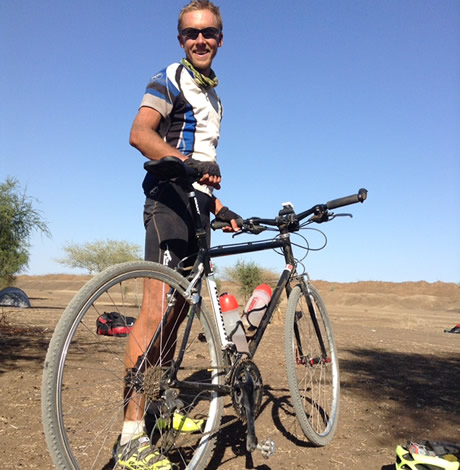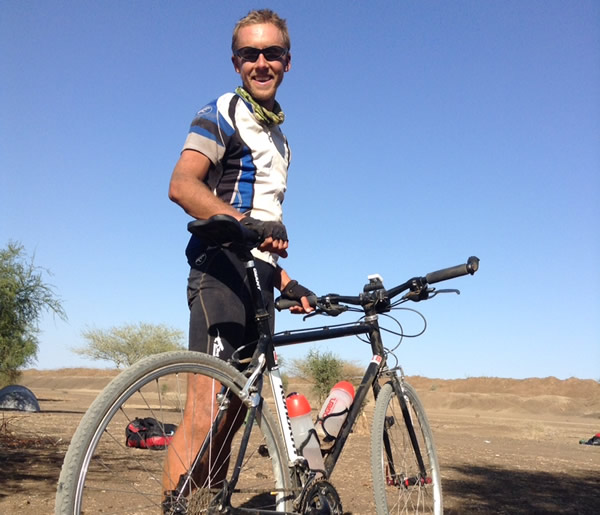Sports
African adventures
Gay cyclist riding from Cairo to Cape Town


Nate Freeman is riding to fight African homophobia. (Photo courtesy Freeman)
When the Blade caught up with American lawyer Nate Freeman, he was just returning from a long weekend of canoeing on the Orange River in Namibia.
Most anyone else would have been resting because on Jan. 9, Freeman embarked on a 12,000-kilometer bike ride from Cairo to Cape Town that will span four months and travel through 10 countries in Africa.
The Out in Africa Ride is the inaugural project for an initiative that is dedicated to identifying and supporting nonprofit groups throughout Africa who are working to fight homophobia, eliminate stigma and provide legal protection to LGBT people.
“A major component of human dignity is the ability to express yourself,” Freeman says. “I was looking for what I could do policy wise and connect that to groups on the ground.”
Freeman requested that this story not be published by the Blade until he passed safely through Egypt and Sudan due to the safety concerns of an LGBT rights advocate crossing their borders.
The Out in Africa Ride is piggybacking on an event known as the Tour d’Afrique and Freeman is one of 40 cyclists on the Tour. They will only have 20 rest days during the four-month ride and several of the ride days will be a stage race similar to the stages in the Tour de France.
The group of cyclists on the Tour range from people who just want to finish to competitive cyclists. Many are riding for causes of their own choosing.
The obstacles the cyclists will face are enormous and include politics, religion, animals, disease, climate, terrain, injuries and stone-throwing children. Last year, two of the riders on the Tour contracted Malaria and there is the constant threat of Dengue fever.
Freeman, 32, was born and raised in Mount Vernon, Iowa and went on to Whitman College. He received his law degree from Yale.
He ran cross country and played tennis in high school, but it wasn’t until his college years that he truly found athletics and it began with rock climbing, hiking, dance and ballet. He segued into triathlons after his college years and continues to dance.
After receiving his law degree, he spent two years clerking for the Honorable Tena Campbell and the Honorable Robert J Shelby in Salt Lake City. It was during that time that Judge Shelby struck down Amendment 3 of Utah’s State Constitution banning same-sex marriage.
For the past year, Freeman has been clerking for Justice Edwin Cameron at the Constitutional Court of South Africa. Cameron is the first and only senior South African official to state publicly that he is living with HIV/AIDS. He is widely known for his advocacy of LGBT rights.
Leading up to the Out in Africa Ride, Freeman found himself struggling with the context of the project he was about to initiate.
“I was forming a challenging role to play,” Freeman says. “When you care about an issue and you are not from the place experiencing the issue, it doesn’t always translate.”
The first purpose of the Ride is to get donors to contribute to programs that are not widely known. They have chosen two organizations as their first partners; the Human Rights Awareness and Promotion Forum in Uganda and the Gay & Lesbian Network in South Africa.
The second purpose is to get local programs to link with other local programs and to share their current campaigns and advocacy strategies.
The timing seems right for this kind of connection between the advocacy groups. The criminalization of same-sex relationships in Africa is widespread and growing. Much of it has made the news, but there are instances in lesser known parts of the continent where the laws are incredibly repressive.
The Ride project has presented an interactive map reflecting the current laws in Africa with three countries showing a same-sex relationship death penalty.
“Many of the intolerant leaders in Africa believe that homosexuality is a Western concept and that LGBT rights are a way for former colonial powers to exercise control,” Freeman says. “As for the people of Africa, many of them don’t realize what rights can be available to them.”
As of the release of this story, the cyclists have crossed 2,916 kilometers of terrain with 9,178 kilometers to go.
Despite the challenges, Freeman remains upbeat about the experience and what lies ahead. Below is an excerpt from his last blog post:
Lest I leave you with a vision that the last week was a complete hellscape, I should point out that the past eight days have included some of the most beautiful moments of the trip. Besides some major bonding time with Simon and with the other cyclists, I was frequently overwhelmed with gratitude for the glimpses of life that I got to see. Very few foreigners ever traverse southern Sudan, and many of the villages we passed are not on any map. Whether it was the vast unpopulated sorghum fields of Sudan or the densely populated but breathtaking highlands of Ethiopia, the scenery more than rewarded the effort it took to view it. Most importantly, I have a sense that I’ve overcome the first major physical and psychological hurdles of the trip. While there are sure to be new challenges ahead, I think Simon and I are ready to face the next three months with a smile. And maybe some body armor.
The Ride can be followed at outinafricaride.org.

More than a dozen LGBTQ athletes won medals at the Milan Cortina Winter Olympics that ended on Sunday.
Cayla Barnes, Hilary Knight, and Alex Carpenter are LGBTQ members of the U.S. women’s hockey team that won a gold medal after they defeated Canada in overtime. Knight the day before the Feb. 19 match proposed to her girlfriend, Brittany Bowe, an Olympic speed skater.
French ice dancer Guillaume Cizeron, who is gay, and his partner Laurence Fournier Beaudry won gold. American alpine skier Breezy Johnson, who is bisexual, won gold in the women’s downhill. Amber Glenn, who identifies as bisexual and pansexual, was part of the American figure skating team that won gold in the team event.
Swiss freestyle skier Mathilde Gremaud, who is in a relationship with Vali Höll, an Austrian mountain biker, won gold in women’s freeski slopestyle.
Bruce Mouat, who is the captain of the British curling team that won a silver medal, is gay. Six members of the Canadian women’s hockey team — Emily Clark, Erin Ambrose, Emerance Maschmeyer, Brianne Jenner, Laura Stacey, and Marie-Philip Poulin — that won silver are LGBTQ.
Swedish freestyle skier Sandra Naeslund, who is a lesbian, won a bronze medal in ski cross.
Belgian speed skater Tineke den Dulk, who is bisexual, was part of her country’s mixed 2000-meter relay that won bronze. Canadian ice dancer Paul Poirier, who is gay, and his partner, Piper Gilles, won bronze.
Laura Zimmermann, who is queer, is a member of the Swiss women’s hockey team that won bronze when they defeated Sweden.
Outsports.com notes all of the LGBTQ Olympians who competed at the games and who medaled.
Sports
US wins Olympic gold medal in women’s hockey
Team captain Hilary Knight proposed to girlfriend on Wednesday

The U.S. women’s hockey team on Thursday won a gold medal at the Milan Cortina Winter Olympics.
Team USA defeated Canada 2-1 in overtime. The game took place a day after Team USA captain Hilary Knight proposed to her girlfriend, Brittany Bowe, an Olympic speed skater.
Cayla Barnes and Alex Carpenter — Knight’s teammates — are also LGBTQ. They are among the more than 40 openly LGBTQ athletes who are competing in the games.
The Olympics will end on Sunday.
Sports
Attitude! French ice dancers nail ‘Vogue’ routine
Cizeron and Fournier Beaudry strike a pose in memorable Olympics performance

Madonna’s presence is being felt at the Olympic Games in Italy.
Guillaume Cizeron and his rhythm ice dancing partner Laurence Fournier Beaudry of France performed a flawless skate to Madonna’s “Vogue” and “Rescue Me” on Monday.
The duo scored an impressive 90.18 for their effort, the best score of the night.
“We’ve been working hard the whole season to get over 90, so it was nice to see the score on the screen,” Fournier Beaudry told Olympics.com. “But first of all, just coming out off the ice, we were very happy about what we delivered and the pleasure we had out there. With the energy of the crowd, it was really amazing.”
Watch the routine on YouTube here.
-

 Mexico5 days ago
Mexico5 days agoUS Embassy in Mexico issues shelter in place order for Puerto Vallarta
-

 Real Estate5 days ago
Real Estate5 days ago2026: prices, pace, and winter weather
-

 Theater5 days ago
Theater5 days agoJosé Zayas brings ‘The House of Bernarda Alba’ to GALA Hispanic Theatre
-

 Netherlands4 days ago
Netherlands4 days agoRob Jetten becomes first gay Dutch prime minister




















